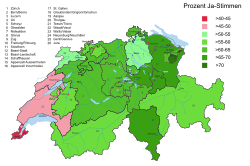Minaret controversy in Switzerland
| Federal popular initiative "against the construction of minarets" |
||||||||||||||||||||||
|---|---|---|---|---|---|---|---|---|---|---|---|---|---|---|---|---|---|---|---|---|---|---|
|
||||||||||||||||||||||
|
||||||||||||||||||||||
The federal popular initiative "against the construction of minarets" was a successful federal popular initiative in Switzerland to prevent the construction of Mosque minarets. In a November 2009 referendum, a constitutional amendment banning the construction of new minarets was approved by 57.5% of the participating voters. Only three of the twenty Swiss cantons and one half canton mostly in the French-speaking part of Switzerland opposed the initiative.
This referendum originates from action on 1 May 2007, when a group of right of centre politicians mainly from the Swiss People's Party and the Federal Democratic Union, the Egerkinger Komittee ("Egerkingen Committee") launched a federal popular initiative that sought a constitutional ban on minarets. The minaret at the mosque of the local Turkish cultural association in Wangen bei Olten is the initial motivation for the initiative.
The Swiss government recommended that the proposed amendment be rejected as inconsistent with basic principles of the constitution. But after the results were tabulated, the government immediately announced that the ban was in effect.
As of the date of the 2009 vote, there were four minarets in Switzerland, attached to mosques in Zürich, Geneva, Winterthur and Wangen bei Olten. These existing minarets are not affected by the ban.
The Swiss minaret controversy began in a small municipality in the northern part of Switzerland in 2005. The contention involved the Turkish cultural association in Wangen bei Olten, which applied for a construction permit to erect a 6-metre-high minaret on the roof of its Islamic community centre. The project faced opposition from surrounding residents, who had formed a group to prevent the tower's erection. The Turkish association claimed that the building authorities improperly and arbitrarily delayed its building application. They also believed that the members of the local opposition group were motivated by religious bias. The Communal Building and Planning Commission rejected the association's application. The applicants appealed to the Building and Justice Department, which reverted the decision and remanded. As a consequence of that decision, local residents (who were members of the group mentioned) and the commune of Wangen brought the case before the Administrative Court of the Canton of Solothurn, but failed with their claims. On appeal the Federal Supreme Court affirmed the decision of the lower court. The 6-metre (20 ft)-high minaret was erected in July 2009.
...
Wikipedia

